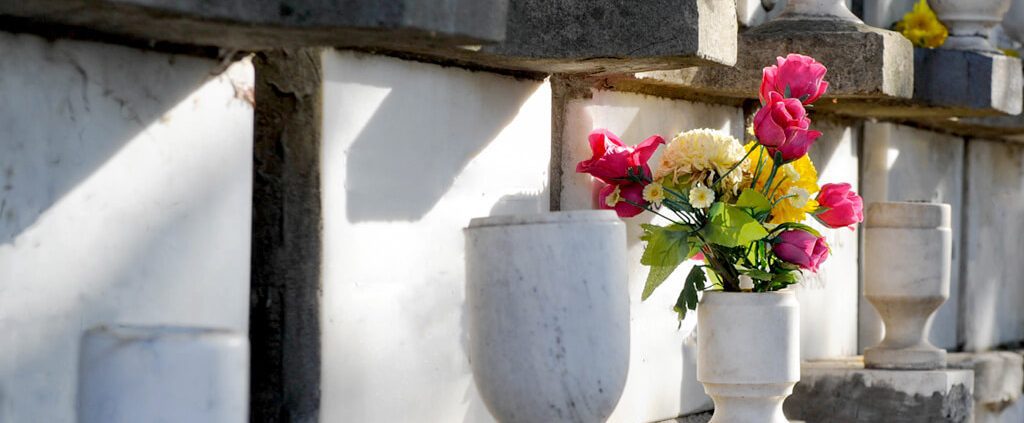How Should Christians View Qing Ming?
Written by Luke Lim, Singapore
My non-Christian family visits a Buddhist monastery yearly to pay respects to my ancestors, as their ashes are kept inside the building’s columbarium. This usually happens during Qing Ming Festival (清明节), which is observed by Chinese communities around the world in the early spring.
My family and I would gather at the monastery of our ancestors to tidy up the columbarium wall and plaques, offer prayers, and perform traditional rituals such as burning joss sticks and offering food to our ancestors. These rituals are done to show our respect for our ancestors, but some of it have veered into ancestral worship over time.
After becoming a Christian, I began questioning the rituals performed during Qing Ming, and whether I should participate in these rituals with my family. When I sought advice from some of my Christian friends, they mentioned that they were uncomfortable attending Qing Ming with their families, since the Bible strongly forbids ancestor worship (Exodus 20:3).
However, this stance put me in a dilemma, as it can be perceived as unfilial or disrespectful to completely refrain from participating in the Qing Ming Festival, causing tensions with my non-believing family members that I am called to love.
I felt that I could not totally reject my Chinese culture and neglect my ties with family members. To be salt and light in the world is not to escape from difficult situations, but rather, to act in a Christ-like manner towards our family members. Moreover, there are parallels between the Bible and traditional Chinese values expressed during Qing Ming, such as showing respect to our parents (Exodus 20:12, Colossians 3:20). Visiting tombs is also mentioned in the Bible as well (Matthew 28:1, John 11:17).
As I began thinking more about how Christians can participate in Chinese festivals such as Qing Ming, these are the questions that I’ve been reflecting on, and continue to reflect on today:
What is cultural and what is religious?
Qing Ming reminds the Chinese community about the traditional values of filial piety—respect for family elders. We also practice filial piety during Chinese New Year, when we visit relatives for meals together. There is nothing wrong with this.
However, there are many ways we can choose to show our respect to our elders. For some, this may take the form of paying their respects through religious acts. For example, some choose to burn incense paper (spiritual money) or paper materials resembling possessions, because it is believed that these materials can be used in the afterlife.
But as Christians, we know that such rituals have no bearing on the afterlife (Luke 16:26, Ecclesiastes 9:5-6, Genesis 3:19), and we should avoid any activities that suggest we have power over the destiny of those departed.
Instead of burning incense paper, we can find other ways to pay respect to the deceased. Traditionally, Singaporean Christians bring white or yellow flowers to the graves to acknowledge the loss of a loved one. Another way we can actively participate in the festival is by tidying up our ancestors’ graves.
Why participate in Qing Ming?
One of the key reasons I choose to participate in Qing Ming is to show my loved ones God’s love. My uncles and aunties, for example, had thought that Christianity was a westernised religion, and that my ancestors had lost a grandson when I became a Christian. However, by joining them in paying respect to our ancestors, I was able to show them that Christianity is for all races and cultures, and this enabled me to better share the gospel with them.
Qing Ming is also a time of reflection, for honouring and giving thanks to our forefathers. Although my grandfather passed away before I was born, I am thankful for his grit and strength in bringing up the family despite coming from a poor background and having health problems. He worked hard to support his family and send all his children to school. Reflecting on this helped me to be thankful for what I have now in my family.
However, we should be careful of our intentions in participating in Qing Ming. Some Chinese rituals, such as offering burnt spiritual money and food to our ancestors, are done with the intention of asking for their blessings. As Christians, we need to ensure our intentions of going to the grave are pure and clear: we take part in it for the sole purpose of remembering our ancestors, without expecting anything in return.
If we are armed with the power of Christ, there is no reason for us to be afraid of participating in Qing Ming. We can pray for wisdom from God to help us recognise some of the values of Chinese culture that reflect Christian truths, and seek to transform them into practices that honour God as well.
How can we be a good testimony to others?
There are times when family members might take offense to our choices. One sister-in-Christ shared that her mother blamed herself for her daughter’s “failed upbringing” when she refused to offer joss sticks to her ancestors. This caused great hurt and confusion for both parties.
When we choose to act differently from our family’s culture, we can expect strong reactions. But when we commit to God our struggle to be a good testimony even in the face of persecution, Christ will provide us with wisdom to handle the conflicts in our families. When we stand by our Christian convictions, even those who persecute us might be convicted by the Holy Spirit that we worship the true and living God (Daniel 3).
If you’re also from a non-Christian family, here’s a tip that may help: To avoid arguments or misunderstandings with your family members, take the time to discuss your faith with them before the Qing Ming festival. Let them know what activities you would be abstaining from, and what you would be doing instead to show respect. For example, instead of holding joss sticks, we can present flowers at the grave. And while our family members are burning offerings, we can clean the plaques of the deceased.
I did this with my father about a month before the Qing Ming festival, which reassured him and my extended family members that I am still respectful of my ancestors even though I now follow Christ. As a result, my father became more receptive to the gospel and even attended a few of my church’s evangelistic services to learn more about Christ.
I pray that as Qing Ming approaches, we Chinese Christians may better understand our Chinese culture as well as God’s Word, so that we can preserve practices that affirm Christian principles. Even if there may be differences in the ways we show respect to our forefathers, hopefully our relatives will understand that our faith can co-exist with Chinese culture as well.
However, if we know of friends or fellow Christians who do not feel comfortable taking part in Qing Ming or prefer to honour their ancestors in different ways, let’s remain respectful, and be open to hear their perspectives. May we develop a balanced Christian view about the Chinese festival so that we can honour both God and our family members during this time.
Looking for more stories like these? Join YMI’s Telegram channel to receive our latest stories on the go.











I feel very strongly about this topic too. As a Chinese Christian, there are many ingrained cultural rules we picked up growing up. From following the lunar calander for many festivals, to rites and practices, even sometimes our daily routines. Do we eat the offerings offered at the ancestral table? Do we eat vegetarian together with our Buddhist family member every 1st and 15th of the lunar month? My biggest dilemma came when I was getting married. So many customs, which is religious and which not! I agree, this comes with much wisdom and prayers. Seeking different opinions from fellow Christians can be confusing, as many advices may be given, and there is no fully right and fully wrong. I choose to be oblivious to the food I take, I don’t question if they were offered at the ancestral alter. Why, simply because I choose to honour and love my parents and to appreciate food placed before me. I eat vegetarian with them if it happens to fall on those days, simply because I want to have an enjoyable meal with them. I know there are others who may disagree, but I see that honouring our father and mother is also a Christian thing we have to oblige by. It is a prayer that over the years, my un-saved parents can come to know Christ through these little actions, and prayers.
Hi Dawn,
Thanks for sharing! It would also help to consider what Paul has shared in 1 Corinthians 10:18-20. 🙂